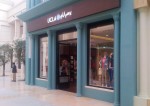The original version of this article contained an error and has been changed. See the bottom of the article for additional information.
Shirts, sweatshirts and jackets line the walls of the store, each emblazoned with the UCLA brand. Vintage athletic photographs of UCLA players, football helmets and other UCLA furnishings pay homage to a university thousands of miles away.
UCLA Apparel Kuwait, the first store of its kind in the Middle East, sells apparel and accessories with the university’s logo and name, and is operated through a contract with Associated Students UCLA.
The store opened in November of last year, and is expected to provide ASUCLA with revenues of more than $25,000 in the first year of operation, said Cynthia Holmes, the director of trademarks and licensing for the association. ASUCLA receives a 10.5 percent revenue on all sales; because the shops are owned and operated by licensees, ASUCLA invests very little in startup costs, Holmes said.
Few universities in the United States license their brands to be sold on apparel in markets around the world, due to limited international appeal of their names, Holmes said. The only major competitor in the niche market is Harvard University, which trademarked its name in 1989, according to the Harvard Crimson.
UCLA, however, is the only American university with a standalone clothing store. Stores and boutiques within high-end department stores have existed in areas such as eastern Asia and Europe for the past 30 years, Holmes said.
The new store is the first of several UCLA licensed stores expected to open in the Middle East in the coming years, she said.
“Internationally, the UCLA brand is very popular,” Holmes said. “People are interested in the concept of American colleges, where you don’t just go in to study, but you have a whole life experience.”
The 1,000-square-foot store in Kuwait was constructed based on designs approved by ASUCLA. Images on the wall depict campus landmarks such as Royce Hall and Powell Library, and symbols such as the Victory Bell, in an effort to show the historical heritage of the campus.
UCLA Apparel Kuwait is operated by Ideal Europe Ltd., the same licensee that currently runs more than 40 small UCLA storefronts within larger department stores in India, in addition to shops throughout Europe, including the United Kingdom.
“Kuwait City is the Paris of the Middle East, so it’s a great place to launch the brand in the Middle East,” said Jas Singh, the director of Ideal Europe.
The store’s clothes are more than merely shirts with a college name on the front, he said.
“They’re a true brand based on a legacy, and they represent the American university experience and life in Southern California,” Singh said.
In the Middle East, American goods sell very well, and brands such as American Eagle and Hollister are successful as a result, he added.
Clothing and accessories for sale in the Kuwait location differ in many ways from those found in American vendors, such as Target or Ackerman Union, Holmes said.
UCLA goods in America have a very emblematic and athletic style, she said.
International customers are more interested in the brand of UCLA as a highly respected educational institution and as a symbol of the Southern Californian lifestyle, and the style of clothing sold reflects this distinction, Holmes added. Garments have less of an athletic feel and are have more of a casual campus style.
“In the broader market we have to compete not with other colleges, but with other high-end clothing brands such as Ralph Lauren, Nautica and Tommy Hilfiger, so design has to be done strategically, with seasonal collections,” Holmes said.
The store does not limit itself to UCLA’s traditional blue and gold colors and does not consider school rivalries in choosing colors – many garments are red.
Red, despite being the color of UCLA’s rival school, USC, cannot be ignored in fashion, especially abroad, since it is viewed as a lucky color in China, Singh said.
Sales in the Middle East are expected to generate between $150,000 and $300,000 per year for ASUCLA by the time multiple stores are in place throughout the region, Holmes said.
Ideal Europe, Ltd. expects to augment their sales from the Kuwaiti, European and Indian stores by an additional 10 percent with the opening of a new online store, UCLAClothing.com, Singh said.
The website features the same clothing for sale in the Kuwait and European stores, and does not sell to the United States market, he said.
Second-year law student Jackson McNeill, who has visited the website, said he would like to see this clothing for sale in America.
“From a consumer standpoint, I thought the clothes were really nice,” McNeill said. “They were probably more expensive than I expected, but if I was able to afford them, I would (buy them).”
The Middle East is one of several regions being pursued by ASUCLA as having future store locations. The firm hopes to open new locations in Dubai, Abu Dhabi and Bahrain in the future, Singh said.
Correction: Jas Singh is the director of Ideal Europe.

great news